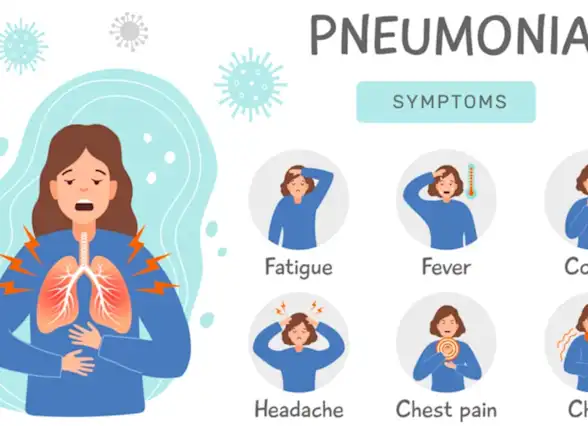Pneumonia Signs and Symptoms
Signs and symptoms of pneumonia vary widely, differ from person to person, and mimic a bad cold or the flu. Know what needs checked.
Get insurance benefits, legal documents, and medical records in one place

Helpful Highlights
Early detection of pneumonia can be difficult.
There are several signs and symptoms of which to be aware.
Pneumonia typically doesn't resolve on its own.
Pneumonia can lead to serious complications if left untreated.
When to see a provider
See a provider if your loved one has difficulty breathing, chest pain, persistent fever (≥ 102 F or 39 C), or persistent cough, especially if the cough produces discolored phlegm.
It's especially important that your loved one see a provider if they are 65 or older, have a chronic health condition (like heart or lung disease) or weakened immune system, or are receiving chemotherapy or taking medication that suppresses the immune system.
For people with heart failure or chronic lung disease, pneumonia can quickly become a life-threatening condition.
What are the signs?
Early symptoms are similar to a bad cold or the flu: fever, dry cough, headache, muscle pain, and weakness. Within a day or two, the symptoms typically get worse, with an increasing cough that starts to produce mucus, shortness of breath, and chest pain (or even stomach pain). There may be a high fever (≥102 F or 39 C), or there may be a low body temperature (below their normal), and shaking chills.
Advanced signs also include a sudden change in mental state, no appetite, extreme fatigue, and a bluish tint around the lips.
What are the symptoms?
Pneumonia symptoms can vary from so mild as to be undetectable, to so severe that hospitalization is required. How the body responds to pneumonia depends on the type of germ causing the infection, age, and overall health.
Mild signs and symptoms are often similar to those of a cold or the flu, but they last longer (more than 1-2 weeks).
Chest pain that gets worse with coughing or deep breathing
Confusion or changes in mental awareness (adults 65 and older)
Cough, which may produce dark yellow, green, brown, or bloody phlegm
Extreme tiredness, weakness, or low energy
Fever, sweating, and shaking chills
Lower than normal body temperature (adults 65 and older, and people with weak immune systems)
Loss of appetite
Nausea, vomiting, or diarrhea
Shortness of breath that gets worse with activity
Rapid, shallow breathing
Rapid, weak pulse
Bluish color to lips and fingernails
Persistent headache
Worsening muscle pain
Restlessness and irritability
Inability to sleep
A change in voiding habits (most likely decreased urination)
What are the potential complications?
Complications of pneumonia in older adults and the elderly are pleurisies, lung abscesses, and acute respiratory distress syndrome (ARDS), which can lead to respiratory failure and organ damage from a lack of adequate circulating oxygen. It can also worsen pre-existing conditions.
RESOURCES
American Lung Association (ALA) - Pneumonia
American Thoracic Society (ATS) - Pneumonia
Johns Hopkins Medicine – Pneumonia
National Institute of Health (NIH) Heart, Lung, & Blood Institute – Pneumonia
World Health Organization (WHO) - Pneumonia
No content in this app, regardless of date, should ever be used as a substitute for direct medical advice from your doctor or other qualified clinician.
Get more support and guidance on insurance benefits, medical records and legal forms.
Helpful brings together your insurance benefits, legal documents, and medical records in one personalized place — so you always know what you have, and never have to search again.

Technology for Health Tasks. Mental Health for the Tough Stuff.
Helpful connects your medical records, insurance, and caregiving tasks automatically. And when you need more than logistics, a therapist is here to guide you.
In-Network and Covered
For Individuals, Couples and Families
HIPAA Compliant, Data Stays Private






